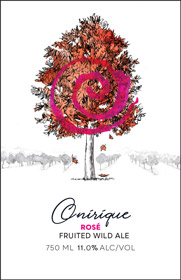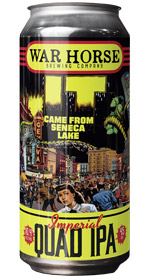Idyll Forest – Onirique 2025
Pryes Brewing Company – Minneapolis, MN
[Wine Hybrid Wild Ale w/ Grenache Grapes – 11.0% ABV]

Pryes (pronounced like “prize”) Brewing Company and their stunning Taproom is located on the western shore of the Mississippi near downtown Minneapolis. But, it’s Pryes’ spinoff brand, Idyll Forest Artisan Ales, which we’re focused on this month. It’s founder Jeremy Pryes’s passion project – dedicated to producing spontaneously fermented and mixed culture beers, along with beer-wine and beer-cider hybrids.
Idyll Forest has been described as a “mad scientist lab” where Jeremy maintains his “flavor library” composed of dozens of different cultures in various vessels. A coolship for traditional lambic-style inoculation and an array of large foeders and barrels from Bordeaux fill out the space. The whole Idyll Forest project is dedicated to discovering uncharted flavor experiences, and the hard work has paid off and is getting noticed, with three medals in the last two years from the annual Festival of Wood & Barrel-Aged Beer (FOBAB) in Chicago – including 1st Place in 2024 in the Wild Beer (Acidic w/ Fruit) category. When you do that in front of such heavyweights as Lost Abbey, Perennial, Boulevard, Three Floyds, Firestone Walker, Goose Island, Half Acre, and 170 more… well, people take notice. Including us.
We’re thrilled to introduce Pryes and Idyll Forest to our members this month with their superb and very limited 2025 vintage of Onirique, a wild ale/wine hybrid with Grenache grapes that took 2.5 years to make. The beer presents a pinkish-reddish-amber hue with minimal foam. On the nose: prominent strawberry, raspberry, and cherry notes come through juicy and quite tart. The open and mixed-culture fermentations lend a noticeable undercurrent of wild yeast funkiness amidst the tart lactic impressions. At the base of the flavor profile is some wild Brettanomyces funk with shades of tropical and orchard fruits. We get a lactic overlay that’s quite tart, evoking Flanders Red impressions. Enrobing the whole affair are the overtly fruity high notes conjuring notes of sour cherry, gooseberry, and many other fruits ending in “-berry.” It’s all very evocative of both fruited lambic and Rodenbach. A delicious moderate sweetness lurks at the backbone too, holding it all together while creating an engaging interplay with the brighter sour elements, culminating in the type of almost savory character that defines our favorite wild and sour beers. Onirique 2025 is easily among both our favorite wild ales and favorite fruited ales we’ve sampled in recent memory – don’t miss it.
It Came From Seneca Lake
War Horse Brewing Company – Geneva, NY
[Quadruple Hazy IPA – 10.4% ABV (16-oz cans)]

Founded in 2008, War Horse Brewing Company has since evolved into a standout craft beer destination in the heart of New York’s Finger Lakes region. The brewery is the creation of the estate’s owners, Dave and Luanne Mansfield, who came into possession of the 40-acre vineyard property in 2006. After brewing in Rochester for years, they opened an on-site brewery in 2016 under the guidance of brewmaster Tony Cordova, previously of Brewery Ommegang and Ithaca Beer Company. It was the start of something great. In 2017, War Horse made big waves at the inaugural NY Craft Beer Competition, capturing three medals (the most of any of the 143 breweries in the competition) including Gold for Lieutenant Dan (in the pale ale category), Silver for The Big Broadcast (DIPA), and Bronze for Tarty McFly (sour/wild ale). This month we’re excited to introduce War Horse to our members with their very limited It Came From Seneca Lake – a superb “monster” Quadruple Hazy IPA brewed in small amounts just once per year.
This super hazy golden brew displays a massive fluffy head with remarkable retention. Crafted with Citra, Hallertau Blanc, Mosaic, Simcoe, and Sabro, the nose is replete with complex juicy and zesty orange, tangerine, and grapefruit citruses, plus softer tropical and stone fruit notes, vinous hints of Sauvignon Blanc, touches of pine resin, and fresh honeydew. On the palate, this is massively pillowy, creamy, and full-bodied thanks to a huge dose of oats and unmalted wheat. Malts offer a light toasty quality in addition to wheaty tanginess, while the hops come through luscious and vibrant. Big fruity esters and hop flavors combine for a bold cocktail of citruses, tropical fruits, and stone fruits, decorated with a slightly evergreen or minty hint. There’s no palate-crushing bitterness – this is decisively New England-style, but there’s still plenty of resinous hop bite in concert with fruity/spicy booziness to offer balance to the residual malt sweetness. This is a huge hazy IPA: massively round, packed full of juicy fruit, and noticeably boozy in just the right way – maintaining a dance with the beer’s sweeter elements all the way through the experience. We loved it.
NOTE: It Came From Seneca Lake is packaged in 16-oz cans, so instead of three 750-ml bottles, your shipment will include six 16-oz cans.

